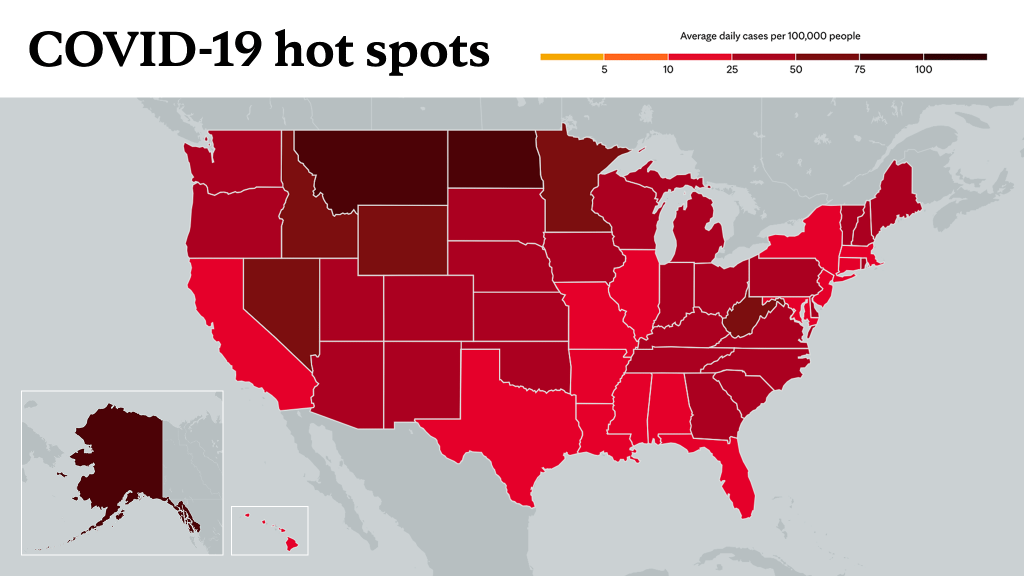
Patients diagnosed with COVID-19 may show neurological symptoms, such as loss of smell, delirium and cognitive impairment. Mayo Clinic researchers are investigating these side effects to determine whether being infected with COVID-19 influences development or progression of Alzheimer's disease and Alzheimer's disease-related dementias (ADRD).
While COVID-19 is primarily regarded as a respiratory disease, brain scans and neuropathological studies confirm brain abnormalities in some patients infected with COVID-19. In addition, a recent Mayo study revealed that approximately half of patients hospitalized with COVID-19 have elevated levels of neurofilament light in their blood. This protein is present only in neurons, which carry and transmit electrical signals throughout the nervous system, and its detection in blood indicates neuronal injury.
To examine that finding further, a team led by Leonard Petrucelli, Ph.D., a Mayo Clinic molecular neuroscientist, and James Meschia, M.D., a Mayo Clinic neurologist, is poised to investigate key questions about the effects of COVID-19 on the brain and assess long-term neurological implications of COVID-19 infection. Dr. Petrucelli is the Ralph B. and Ruth K. Abrams Professor of Neuroscience.
Adults 65 and older are especially vulnerable to COVID-19 and at higher risk of developing Alzheimer's disease-related dementias.
The researchers plan to study:
- Blood neurofilament light protein.
- Other proteins associated with Alzheimer's disease, such as tau and beta amyloid.
- Changes in cognition, behavior and daily function related to neurodegenerative disorders, which may be unmasked or accelerated by COVID-19.
Imaging for markers of brain neuroinflammation and beta amyloid pathology may help researchers determine whether neuroinflammation associated with COVID-19 triggers or accelerates the buildup of beta amyloid.
Watch: Dr. Meschia share more about the link between COVID-19 and neurologic symptoms.
Journalists: Sound bites with Dr. James Meschia are in the downloads at the end of the post. Please courtesy: "James Meschia, M.D. / Neurology / Mayo Clinic."
This research is funded by a grant from the National Institute of Neurological Disorders and Stroke under award 3R35NS097273-05S1.
"With this award, and leveraging the vast expertise of our multidisciplinary team, we are well-poised to elucidate the impact of COVID-19 on the brain and its contribution to ADRDs ― information necessary in our quest to combat these detrimental consequences," says Dr. Petrucelli.
The research team consists of these Mayo Clinic physicians and scientists:
- Hancheng Cai, Ph.D.
- Casey Cook, Ph.D.
- Gregory Day, M.D.
- Dennis Dickson, M.D.
- Young Erben, M.D.
- Tania Gendron, Ph.D.
- Manoj Jain, M.D.
- Christian Lachner, M.D.
- Christopher Marquez, M.D.
- Ephraim Parent, M.D., Ph.D.
- Mercedes Prudencio, Ph.D.
_____________________________________
Information in this post was accurate at the time of its posting. Due to the fluid nature of the COVID-19 pandemic, scientific understanding, along with guidelines and recommendations, may have changed since the original publication date.
For the safety of our patients, staff and visitors, Mayo Clinic has strict masking policies in place. Anyone shown without a mask was either recorded prior to COVID-19 or recorded in a nonpatient care area where social distancing and other safety protocols were followed.
For more information and all your COVID-19 coverage, go to the Mayo Clinic News Network and mayoclinic.org.
Learn more about Tracking COVID-19 and COVID-19 trends.








